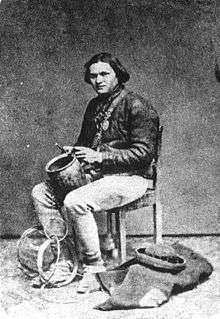Tinker
Tinker or tinkerer is an archaic term for an itinerant tinsmith who mends household utensils.

Description
Tinker for metal-worker is attested from the 13th century as tyckner or tinkler.[1] Some travelling groups and Romani people specialised in the trade, and the name was particularly associated with indigenous Irish Travellers and Scottish Highland Traveller. However, this use is considered offensive.[2]
The term "tinker", in British English, may refer to a mischievous child.[2] Some modern-day nomads with an English, an Irish or a Scottish influence call themselves "techno-tinkers" or "technogypsies" and are found to possess a revival of sorts of the romantic view of the tinker's lifestyle.[3]
Tinker's dam
A tinker's dam is a temporary patch to repair a hole in a metal vessel, such as a pot or a pan. It was used by tinkers and was usually made of mud or clay, or sometimes other materials at hand, such as wet paper. The material was built up around the outside of the hole, so as to plug it. Molten solder was then poured on the inside of the hole. The solder cooled and solidified against the dam and bonded with the metal wall. The dam was then brushed away. The remaining solder was then rasped and smoothed down by the tinker.[4][5]
In the Practical Dictionary of Mechanics of 1877, Edward Knight gives this definition: "Tinker's-dam: a wall of dough raised around a place which a plumber desires to flood with a coat of solder. The material can be but once used; being consequently thrown away as worthless".[6]
Tinker's curse
The common use of "tinker's dam" may have influenced the English phrase tinker's curse, which expresses contempt. The phrases tinker's damn and tinker's curse may also be applied to something considered insignificant. An example: "I don't give a tinker's curse what the doctor thinks", sometimes shortened to, "I don't give a tinker's about the doctor." A tinker's curse or cuss was considered of little significance because tinkers (who worked with their hands near hot metal) were reputed to swear (curse) habitually.[6]
See also
- Mercheros
- Irish Travellers
- Scottish Travellers
- Tinsmith
References
- "Full text of 'Scottish Gypsies under the Stewarts'". archive.org.
- "Tinker". Collins English Dictionary (Complete & Unabridged 11th ed.). Retrieved 24 October 2012.
- McGowan, Leaf & Baurley, Thomas (2005). Techno-Gypsies, Techno-Nomads, and Techno-Tinkers. Seattle, Washington-: Tree Leaves Publishing.CS1 maint: uses authors parameter (link)
- "A Tinker's dam". usingenglish.com.
- Bonner, John & Curtis, George William (1905). "Tinkers". Harper's Weekly. 49. p. 1424. Retrieved 2 April 2012.CS1 maint: uses authors parameter (link)
- Martin, Gary. "Tinker's Dam". The Phrase Finder.
External links
